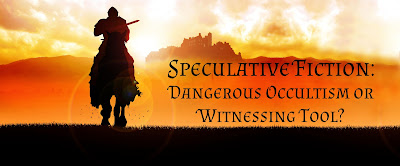It's impossible to know me and be unaware of how much I love science fiction and fantasy. It's just a big part of what makes me me. And so it's not probably a surprise that when my English professor said we could write our research papers on pretty much anything as long as we could research it and make an argument about it, I decided to write about speculative fiction. More specifically, the role speculative fiction plays in the Christian community.
It's not really a secret that said role can be rather controversial. One need only look at Harry Potter to see that. So I set out down a rabbit hole of research on the objections to and defenses for science fiction and fantasy in the Christian community. It was a fascinating research subject, and I wanted to share the results.
Some believe speculative fiction is occult and evil. Some believe it is a good thing that can be used for God's glory. Where do I fall? I'm sure you can guess, but go on this journey with me anyway to explore my conclusion and how I came to it.
Speculative Fiction: Dangerous Occultism or Witnessing Tool?
When I was young, I went through a phase where I struggled to understand the efficacy of prayer. I believe God is sovereign and in control, and that nothing happens that is outside of His will. So what good does it truly do to pray? As I pondered this, a passage from C. S. Lewis’s The Magician’s Nephew sprang unbidden to my mind:
“Well, I do think someone might have arranged about our meals,” said Digory.“I’m sure Aslan would have, if you’d asked him,” said Fledge.“Wouldn’t he know without being asked?” said Polly.“I’ve no doubt he would,” said the Horse (still with his mouth full). “But I’ve a sort of idea he likes to be asked.”
From this I understood instantly that while God does know everything and He is sovereign, He still wants us to pray, to deepen our relationship with Him as well as our understanding that everything we have comes from Him. He wants us to ask. From that point forward, I ceased to struggle with this particular issue—all because of a few lines in a fantasy story. And this is only one example of spiritual understanding gained from speculative fiction.
Yet some allege that these very stories and others like them which deepened my understanding of Scripture, illustrated biblical truths, and enhanced my faith are inherently harmful and evil, rather promoting such things as occultism, humanism, and witchcraft. Many of my fellow writers within the Realm Makers community have faced backlash from family and church family for writing stories of magic, dragons, aliens, and more.
Is there merit to these accusations that these stories we write tamper with the forbidden? Or is it rather true, as others assert, that speculative fiction is the perfect vessel for spreading God’s truth and reflecting the creative aspects of His nature? I contend that while these genres of fantasy and science fiction must be handled with care and a solid grounding in Scripture as a result of certain genuine concerns, they are nevertheless effective vessels for conveying God’s truth and furthering His kingdom by exploring truth in new and imaginative ways.
Speculative Fiction: The Question of Magic
References
“Christian Science Fiction & Fantasy Explained.” Performance by Steve Laube, YouTube, Enclave Publishing, 10 Sept. 2015, https://www.youtube.com/watch?v=OelI7pD6-jQ&t=73s. Accessed 30 Sept. 2021.
Lewis, C. S. The Magician's Nephew. Scholastic Inc, 1995.



Brilliant!
ReplyDelete